



http://www.youtube.com/watch?v=-e66ByetpDY
Related: english • IngleseAmerican English Pronunciation Podcasts Listen now! Note: The most current podcast will begin playing, scroll down to the episode you wish to listen to. Other Stuff at Pronuncian Irregular Verbs — Exercise 1 Directions: In the exercise that follows, you will read sentences that contain blanks. These blanks require the appropriate forms of irregular verbs. To keep track of your answers, print the accompanying handout. If you are unsure which choice to make, consult the rules. Disclaimer: All prizes in this exercise are cyber, which means they have no physical reality and cannot be collected for use in the material world. Transition Words & Phrases As a "part of speech" transition words are used to link words, phrases or sentences. They help the reader to progress from one idea (expressed by the author) to the next idea. Thus, they help to build up coherent relationships within the text. Transitional Words This structured list of commonly used English transition words — approximately 200, can be considered as quasi complete. It can be used (by students and teachers alike) to find the right expression.
Adverbs of frequency Teaching adverbs of frequency has to consist of several steps. First, the students have to learn the words. If they do not know the words it is useless to teach them the grammar. Once you are sure that the students know the adverbs you have to teach them where they should place them in a sentence. Category Synonyms, Category Antonyms Relevance Relevance ranks synonyms and suggests the best matches based on how closely a synonym’s sense matches the sense you selected. Complexity Complexity sorts synonyms based on their difficulty. Adjust it higher to choose from words that are more complex. Happy English Podcast Learn English Podcast: Play in new window | Download Subscribe: iTunes | I drove to Boston last weekend. Photo Credit: Stephen R. Pellerine Photography on Facebook & Instagram
Vocabulary Basics: Word Families - Page 1 (A-F) This section of EnhanceMyVocabulary.com is all about learning new vocabulary by studying groups of words that share common roots A significant aid to learning new vocabulary is to study groups of words that share common roots. Following is a list of such words preceded by their root. In each set you'll find (1.) a list of fairly familiar words that embody the root and (2.) a list of less familiar words that embody it. AAg, act, ig (carry on, do, drive) 1. agent, agitate, agile, act, actor, actuate, exact, enact, reaction, counteract, transact, mitigate, navigate, prodigal, assay, essay; 2. agenda, pedagogue, synagogue, actuary, redact, castigate, litigation, exigency, ambiguous, variegated, cogent, cogitate.
Teaching English online Ever thought about teaching English online? Sylvia Guinan , online English teacher and current winner of the British Council TeachingEnglish blog award , walks us through the opportunities and pitfalls. There are many different things to consider when it comes to online teaching. EAP Vocabulary Academic Word List Coxhead (2000). The most frequent word in each family is in italics. There are 570 headwords and about 3000 words altogether. For more information see The Academic Word List.
Learn English Free Archives 1. Watch English movies/serials: Watching English movies or cartoons with subtitles (dialogues are shown in English) can help us in learning English. We can start with watching cartoons like, ‘Tom & Jerry’, ‘Tin Tin’, ‘Looney Tunes’ or T.V. serials like, ‘Koffee with Karan’ or follow YouTube channels like, look who’s talking with Niranjan Iyenger.